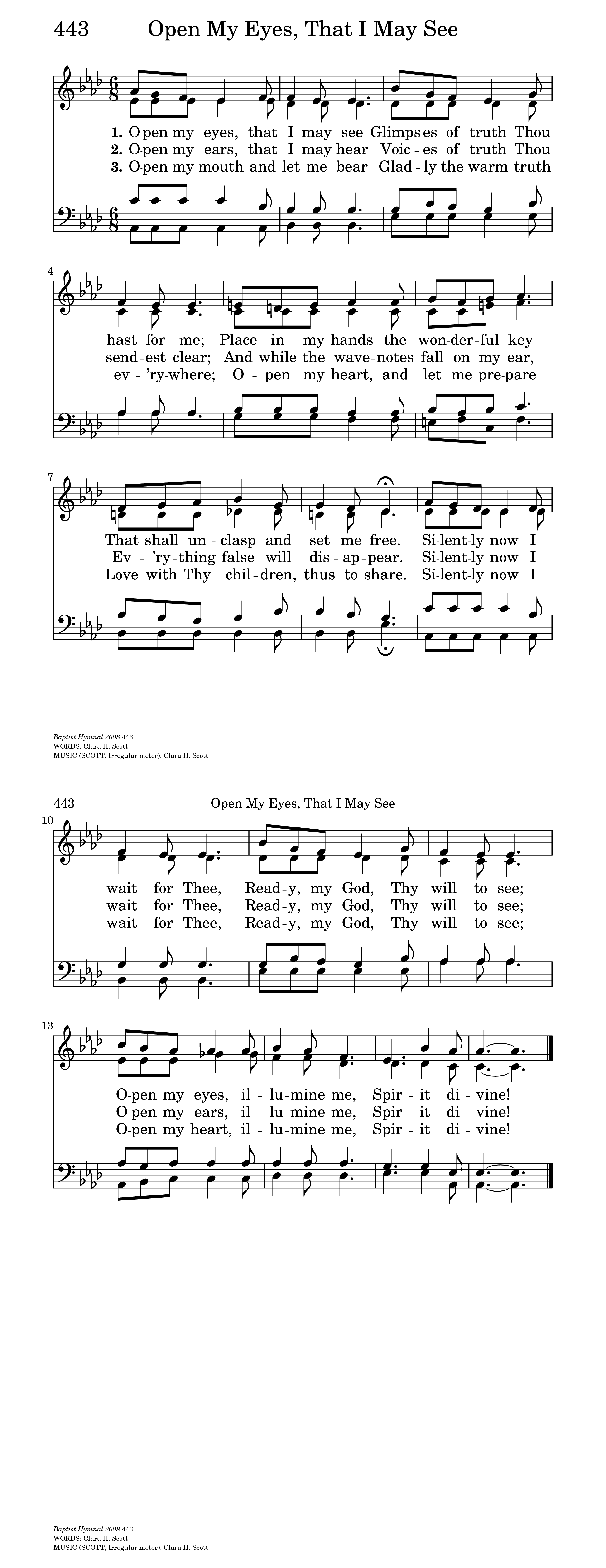While, hungry and thirsty, my heart asks alone
Thy Spirit, poured forth to make whole.
Lord Jesus, grant grace in its fullness
Brimfull in my heart to be poured;
Thou only my strength and my wholeness,
Yes, Thou art my plenty, Lord!
2. Lord Jesus, break from me the bonds of my sin,
That I may be pure, every part;
Let earthly deceits have no lodging within,
No crevice to hide in my heart.
Lord Jesus, grant grace in its fullness
Brimfull in my heart to be poured;
Thou only my strength and my wholeness,
Yes, Thou art my plenty, Lord!
3. Lord Jesus, grant faith such as Jacob's that night,
To wrestle in prayer and not cease;
And though the world's billows mount high in their might,
Still grant me the gift of Thy peace.
Lord Jesus, grant grace in its fullness
Brimfull in my heart to be poured;
Thou only my strength and my wholeness,
Yes, Thou art my plenty, Lord!
4. Lord Jesus, let love like the love in Thy heart
Be mine without let or alloy
Until I am filled to the uttermost part,
To live in Thy love and Thy joy.
Lord Jesus, grant grace in its fullness
Brimfull in my heart to be poured;
Thou only my strength and my wholeness,
Yes, Thou art my plenty, Lord!
5. Lord Jesus, I know that Thy Spirit, who came
To live in my heart, there will dwell.
Now grant the great gift in the strength of Thy name
That I may but serve my Lord well.
Lord Jesus, grant grace in its fullness
Brimfull in my heart to be poured;
Thou only my strength and my wholeness,
Yes, Thou art my plenty, Lord!
“Heart Longings” was written during a time when many hymnwriters were exploring themes of personal holiness, deeper consecration, and the indwelling presence of the Holy Spirit. These themes were particularly emphasized during the late 19th and early 20th centuries, in the aftermath of revival movements in both America and Britain. Many believers who had already come to saving faith in Christ began to desire something more—an ongoing, abiding experience with God that went beyond initial conversion. Hymns like “Heart Longings” expressed this growing hunger.
The anonymous or little-known author of this hymn may have drawn inspiration from Psalm 42 or Psalm 63, where David describes his deep yearning for God in the wilderness. The language used in “Heart Longings” reflects that same spiritual thirst—a desire not merely to perform religious duty, but to dwell in the presence of God, to hear His voice, and to walk in His Spirit. For many believers, the hymn became a private prayer set to music, an invitation for God to enter the hidden places of the soul and fill them with His peace and power.
One of the possible reasons this hymn resonates so deeply is because it doesn’t focus on outward achievement or dramatic conversion, but on inward longing—a theme that often goes unspoken in church music. The singer is not boasting of spiritual triumph but instead acknowledging a holy discontent: “My soul is not satisfied with anything less than You, Lord.” This vulnerability is part of what makes “Heart Longings” timeless.
In devotional gatherings, especially during quiet evening services or prayer meetings, the hymn was often sung softly, almost like a whisper of the heart. Its influence may not be as widely published or celebrated as hymns like “Just As I Am” or “I Need Thee Every Hour,” but it falls within the same family of songs that speak of spiritual intimacy and surrender.
In many hymnals where it appears, “Heart Longings” is placed among the hymns about consecration, revival, or quiet time with God. These contexts highlight its purpose—not to stir loud emotion but to invite reflection and a heartfelt return to God’s presence.
Whether the hymn was born from personal sorrow, revival fire, or a simple moment of quiet prayer, it continues to serve as a musical expression of what many Christians feel in their journey with the Lord—a longing that nothing else in the world can satisfy. It remains a spiritual echo of the soul’s deepest cry: “Draw me nearer, Lord; dwell within me; still my heart until it beats with Yours.”
If you'd like, I can attempt to trace the hymn’s first publication or its composer with more detail. Do you have a version of the lyrics or know which hymnal it appears in? That would help narrow down the origin further.




